Good afternoon! How are you doing? Can
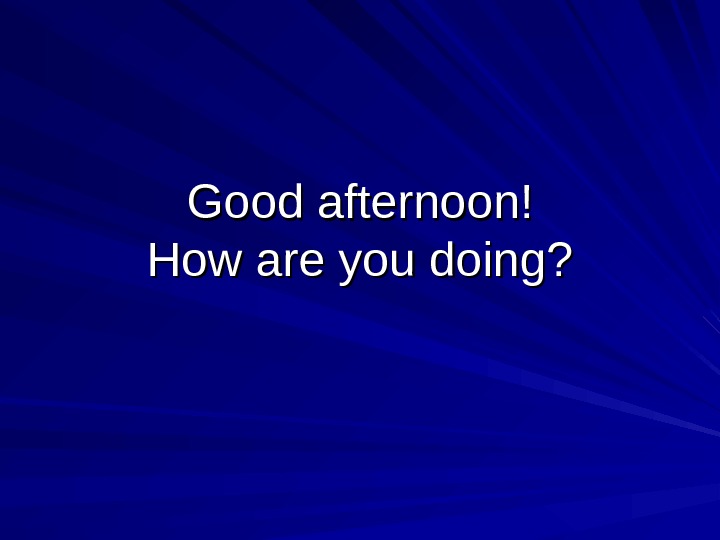











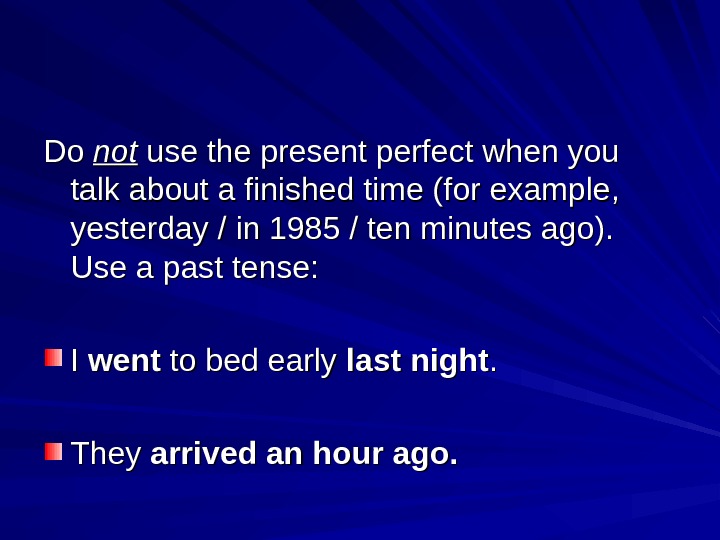




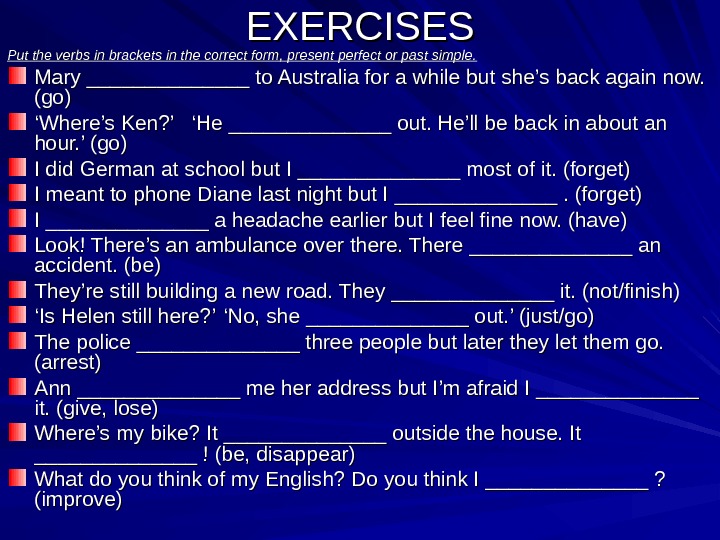

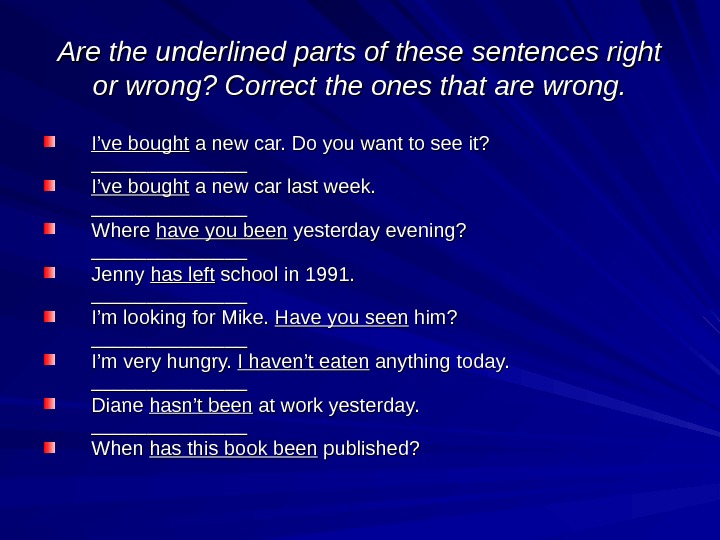
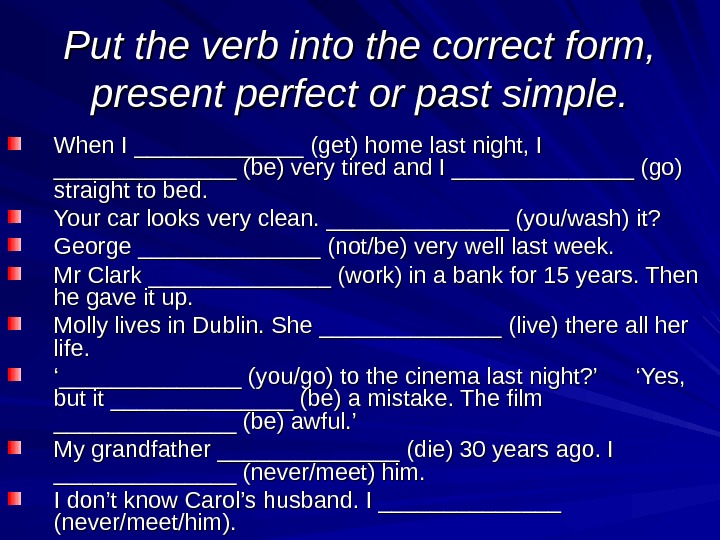
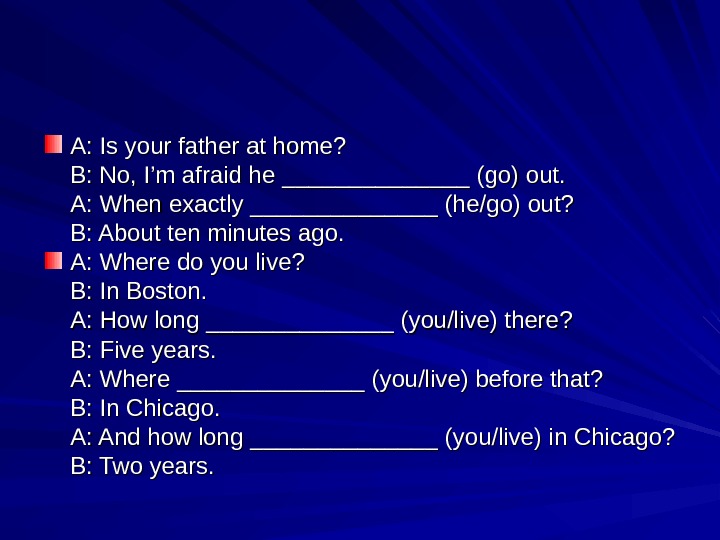
- Размер: 1.1 Mегабайта
- Количество слайдов: 22
Описание презентации Good afternoon! How are you doing? Can по слайдам
 Good afternoon! How are you doing?
Good afternoon! How are you doing?
 Can you think of a film you have seen that has taught you about a person/ event in history?
Can you think of a film you have seen that has taught you about a person/ event in history?
 Listen to the first part of a radio programme about films and answer the questions What type of film does the programme talk about? Why are these films so popular?
Listen to the first part of a radio programme about films and answer the questions What type of film does the programme talk about? Why are these films so popular?

 Listen to the second part of the programme and answer the questions
Listen to the second part of the programme and answer the questions
 Present Perfect or Past Simple? 1. 1. Use the ______ to talk about experiences or things that happened before now. The time is not specified or important. 2. 2. Use the ______ to talk about resent events, or action which started in the past and continues now. 3. 3. Use the ______ to talk about a specific event in the past (we know when the event happened). 4. 4. Use the ______ to talk about an action which starts and finishes in the past. PP PP PS PS
Present Perfect or Past Simple? 1. 1. Use the ______ to talk about experiences or things that happened before now. The time is not specified or important. 2. 2. Use the ______ to talk about resent events, or action which started in the past and continues now. 3. 3. Use the ______ to talk about a specific event in the past (we know when the event happened). 4. 4. Use the ______ to talk about an action which starts and finishes in the past. PP PP PS PS
 Present perfect and past simple (( I have done and I did )) The present perfect is a present tense. It always tells us something about nownow. . The past simple tells us only about the past. .
Present perfect and past simple (( I have done and I did )) The present perfect is a present tense. It always tells us something about nownow. . The past simple tells us only about the past. .
 Examples: Jack grew a beard but now he has shaved it off. They went out after lunch and they have just come back.
Examples: Jack grew a beard but now he has shaved it off. They went out after lunch and they have just come back.
 Do Do notnot use the present perfect if there is no connection with the present (for example, things that happened a long time ago): The Chinese invented printing. How many plays diddid Shakespeare write ? ?
Do Do notnot use the present perfect if there is no connection with the present (for example, things that happened a long time ago): The Chinese invented printing. How many plays diddid Shakespeare write ? ?
 Compare: Shakespeare wrote many plays. My sister is a writer. She has written many books.
Compare: Shakespeare wrote many plays. My sister is a writer. She has written many books.
 We use the present perfect to give new information or to announce a recent happening: Ow! I have cut my finger! The police have arrested two men in connection with the robbery.
We use the present perfect to give new information or to announce a recent happening: Ow! I have cut my finger! The police have arrested two men in connection with the robbery.
 You can use the present perfect with just , , already and yetyet. . Just = ‘a short time ago’ ‘‘ Hello. Have you just arrived ? ’? ’ We use already to say that something happened sooner than expected. ‘‘ He’He’ s already gone. ’. ’ Yet = ‘until now’ and shows that the speaker is expecting something to happen. Use yetyet only in questions and negative sentences. ‘‘ I’ve written the letter but I haven’t posted it it yetyet. ’. ’
You can use the present perfect with just , , already and yetyet. . Just = ‘a short time ago’ ‘‘ Hello. Have you just arrived ? ’? ’ We use already to say that something happened sooner than expected. ‘‘ He’He’ s already gone. ’. ’ Yet = ‘until now’ and shows that the speaker is expecting something to happen. Use yetyet only in questions and negative sentences. ‘‘ I’ve written the letter but I haven’t posted it it yetyet. ’. ’
 Do Do notnot use the present perfect when you talk about a finished time (for example, yesterday / in 1985 / ten minutes ago). Use a past tense: I I went to bed early last night. . They arrived an hour ago.
Do Do notnot use the present perfect when you talk about a finished time (for example, yesterday / in 1985 / ten minutes ago). Use a past tense: I I went to bed early last night. . They arrived an hour ago.
 Use a past tense to ask When. . . ? What time. . . ? When did they arrive ? ? What time did you finish work?
Use a past tense to ask When. . . ? What time. . . ? When did they arrive ? ? What time did you finish work?
 Compare present perfect and past simple: Present perfect • for actions which have happened in your life before nownow. These are often general experiences. It isn’t important exactly when these things happened. For example, today, this week, since 1985, ever , never • Recent events (events which happened a short time ago) just, yet and already Past simple • For events that happened long time ago • for a finished time in the past. • A specific event which happened at a specific time. For example, yesterday, last week, from 1985 to 1991. .
Compare present perfect and past simple: Present perfect • for actions which have happened in your life before nownow. These are often general experiences. It isn’t important exactly when these things happened. For example, today, this week, since 1985, ever , never • Recent events (events which happened a short time ago) just, yet and already Past simple • For events that happened long time ago • for a finished time in the past. • A specific event which happened at a specific time. For example, yesterday, last week, from 1985 to 1991. .
 Compare present perfect and past simple: Present perfect Past simple I / You / We / They have + V-ed/ V 3 He/ She/ It has + V-ed/ V 3 I / You / We / They have + not + V-ed/ V 3 He/ She/ It has+ not + V-ed/ V 3 ? Have Has I / you / we / they he/ she/ it V-ed/ V 3 ? I / You / We / They V-ed/ V 2 He/ She/ It I / You / We / They did + not + V He/ She/ It Did I / you / we / they he/ she/ it V? ?
Compare present perfect and past simple: Present perfect Past simple I / You / We / They have + V-ed/ V 3 He/ She/ It has + V-ed/ V 3 I / You / We / They have + not + V-ed/ V 3 He/ She/ It has+ not + V-ed/ V 3 ? Have Has I / you / we / they he/ she/ it V-ed/ V 3 ? I / You / We / They V-ed/ V 2 He/ She/ It I / You / We / They did + not + V He/ She/ It Did I / you / we / they he/ she/ it V? ?
 Complete the text with the correct form of the verbs in brackets
Complete the text with the correct form of the verbs in brackets
 EXERCISES Put the verbs in brackets in the correct form, present perfect or past simple. Mary ______________ to Australia for a while but she’s back again now. (go) ‘‘ Where’s Ken? ’ ‘He ______________ out. He’ll be back in about an hour. ’ (go) I did German at school but I ______________ most of it. (forget) I meant to phone Diane last night but I ______________. (forget) I ______________ a headache earlier but I feel fine now. (have) Look! There’s an ambulance over there. There ______________ an accident. (be) They’re still building a new road. They ______________ it. (not/finish) ‘‘ Is Helen still here? ’ ‘No, she ______________ out. ’ (just/go) The police ______________ three people but later they let them go. (arrest) Ann ______________ me her address but I’m afraid I ______________ it. (give, lose) Where’s my bike? It ______________ outside the house. It ______________ ! (be, disappear) What do you think of my English? Do you think I ______________ ? (improve)
EXERCISES Put the verbs in brackets in the correct form, present perfect or past simple. Mary ______________ to Australia for a while but she’s back again now. (go) ‘‘ Where’s Ken? ’ ‘He ______________ out. He’ll be back in about an hour. ’ (go) I did German at school but I ______________ most of it. (forget) I meant to phone Diane last night but I ______________. (forget) I ______________ a headache earlier but I feel fine now. (have) Look! There’s an ambulance over there. There ______________ an accident. (be) They’re still building a new road. They ______________ it. (not/finish) ‘‘ Is Helen still here? ’ ‘No, she ______________ out. ’ (just/go) The police ______________ three people but later they let them go. (arrest) Ann ______________ me her address but I’m afraid I ______________ it. (give, lose) Where’s my bike? It ______________ outside the house. It ______________ ! (be, disappear) What do you think of my English? Do you think I ______________ ? (improve)
 Are the underlined parts of these sentences right or wrong? Correct the ones that are wrong. How many plays has Shakespeare written ? ? Have you read any of Shakespeare’s plays Aristotle has been a Greek philosopher. Ow! I’ve cut my finger. It’s bleeding. My grandparents have got married in London. Where have you been born ? ? Mary isn’t at home. She’s gone shopping
Are the underlined parts of these sentences right or wrong? Correct the ones that are wrong. How many plays has Shakespeare written ? ? Have you read any of Shakespeare’s plays Aristotle has been a Greek philosopher. Ow! I’ve cut my finger. It’s bleeding. My grandparents have got married in London. Where have you been born ? ? Mary isn’t at home. She’s gone shopping
 Are the underlined parts of these sentences right or wrong? Correct the ones that are wrong. I’ve bought a new car. Do you want to see it? ______________ I’ve bought a new car last week. ______________ Where have you been yesterday evening? ______________ Jenny has left school in 1991. ______________ I’m looking for Mike. Have you seen him? ______________ I’m very hungry. I haven’t eaten anything today. ______________ Diane hasn’t been at work yesterday. ______________ When has this book been published?
Are the underlined parts of these sentences right or wrong? Correct the ones that are wrong. I’ve bought a new car. Do you want to see it? ______________ I’ve bought a new car last week. ______________ Where have you been yesterday evening? ______________ Jenny has left school in 1991. ______________ I’m looking for Mike. Have you seen him? ______________ I’m very hungry. I haven’t eaten anything today. ______________ Diane hasn’t been at work yesterday. ______________ When has this book been published?
 Put the verb into the correct form, present perfect or past simple. When I _____________ (get) home last night, I ______________ (be) very tired and I ______________ (go) straight to bed. Your car looks very clean. ______________ (you/wash) it? George ______________ (not/be) very well last week. Mr Clark ______________ (work) in a bank for 15 years. Then he gave it up. Molly lives in Dublin. She ______________ (live) there all her life. ‘‘ ______________ (you/go) to the cinema last night? ’ ‘Yes, but it ______________ (be) a mistake. The film ______________ (be) awful. ’ My grandfather ______________ (die) 30 years ago. I ______________ (never/meet) him. I don’t know Carol’s husband. I ______________ (never/meet/him).
Put the verb into the correct form, present perfect or past simple. When I _____________ (get) home last night, I ______________ (be) very tired and I ______________ (go) straight to bed. Your car looks very clean. ______________ (you/wash) it? George ______________ (not/be) very well last week. Mr Clark ______________ (work) in a bank for 15 years. Then he gave it up. Molly lives in Dublin. She ______________ (live) there all her life. ‘‘ ______________ (you/go) to the cinema last night? ’ ‘Yes, but it ______________ (be) a mistake. The film ______________ (be) awful. ’ My grandfather ______________ (die) 30 years ago. I ______________ (never/meet) him. I don’t know Carol’s husband. I ______________ (never/meet/him).
 A: Is your father at home? B: No, I’m afraid he ______________ (go) out. A: When exactly ______________ (he/go) out? B: About ten minutes ago. A: Where do you live? B: In Boston. A: How long ______________ (you/live) there? B: Five years. A: Where ______________ (you/live) before that? B: In Chicago. A: And how long ______________ (you/live) in Chicago? B: Two years.
A: Is your father at home? B: No, I’m afraid he ______________ (go) out. A: When exactly ______________ (he/go) out? B: About ten minutes ago. A: Where do you live? B: In Boston. A: How long ______________ (you/live) there? B: Five years. A: Where ______________ (you/live) before that? B: In Chicago. A: And how long ______________ (you/live) in Chicago? B: Two years.
